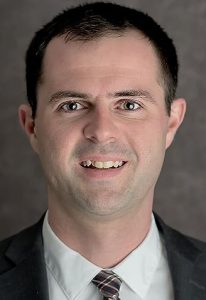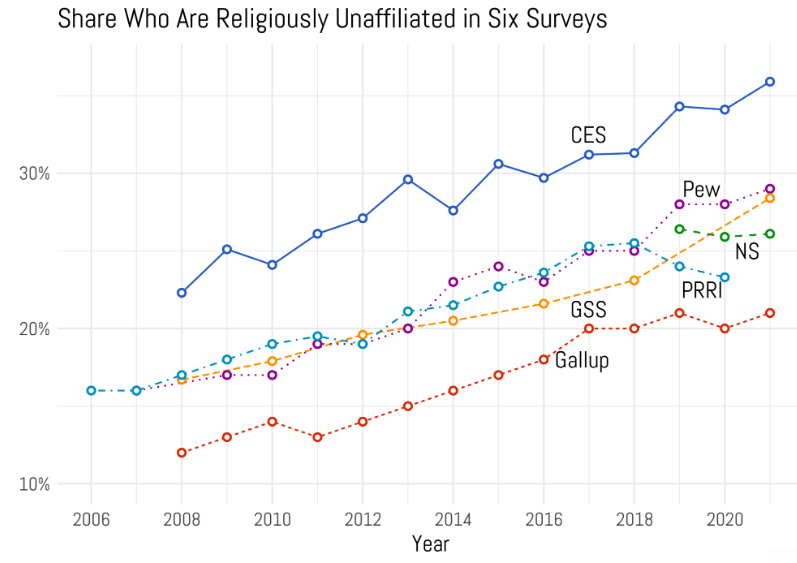A team of scholars is launching a new research project aimed at learning about religiously unaffiliated Americans, including how they find meaning in life and when and why they stopped being religious.
Funded by a three-year, $339,000 grant from the John Templeton Foundation, the Making Meaning Project will be the largest survey ever conducted of the group also known collectively as the “nones,” said project co-leader Ryan Burge, assistant professor of political science at Eastern Illinois University. He will work with Tony Jones, a Minnesota-based scholar and theologian.

Ryan Burge
“A lot of it is trying to understand how nones find joy, where they get encouragement in life and how they navigate the issues in life that religious people have a framework for navigating. And we want to get a sense of how they feel about themselves,” said Burge, author of The Nones: Where They Came From, Who They Are, and Where They Are Going, and 20 Myths about Religion and Politics in America.
To date, much of the data available about this demographic has been gleaned from surveys of 2,000 or fewer respondents and focused on larger trends in American religion. And previous studies typically defined nones as atheists, agnostics or “nothing in particular.”
The Making Meaning Project, on the other hand, will poll 12,000 non-religious people and 2,000 religious people in a quantitative survey “in order to figure out a new way of thinking about non-religion in America,” Burge said. “The old way was put together quickly and, after using it for over 15 years now, it seems not to be all that helpful.”
“The future of religion in this country is non-religion. We have to start thinking about religion in a different way.”
The new project is well worth the time, effort and money because the nones are on the way to being the largest segment in U.S. religion, he explained. “The future of religion in this country is non-religion. We have to start thinking about religion in a different way. The spirituality versus religion debate is where we are headed in the future.”
The number and types of questions also will be expanded on the coming survey. “We want to ask questions like, ‘Was there any point in life where you considered yourself religious? At what age did you consider yourself religious, and how old were you when you stopped being religious? Was it 8 or 18 or 28?,’” he explained. “When are people making that switch in their head about when they are no longer religious? At the moment, we don’t know what ages nones are leaving religion.”
Another mystery is the degree to which some nones consider themselves spiritual, Burge said. “We will ask things like, ‘How spiritual are you?’ Some are spiritual and not religious, and some are completely non-spiritual and non-religious. We just don’t have answers to those questions right now.”
There may be those, too, who do not consider themselves spiritual yet engage in activities that have spiritual aspects, he added. “There will be a series of questions such as, ‘Do you practice yoga or meditation or astrology?’ A lot of practices are individualized and some are communal, and we will be asking about that.”

The study also will delve into nones’ attitudes toward religion. “Do they think religion is a good thing, or a bad thing? Would they prefer the president of the United States be a person of faith, or not? We need to explore these things because it will tell us about the nones’ orientation toward religion.”
Burge predicted the study will prove some nones to be “incredibly aware” of their non-religious status.
“For some people, non-religion is a very big part of their identity, and for some it is a very small part of their identity.”
“I think we are going to find evangelical atheists who are very much defined by atheism, and they want you to become an atheist too, while some atheists are libertarian atheists along the lines of ‘I don’t believe and I don’t care if you do, but just keep it over there,’” he said. “For some people, non-religion is a very big part of their identity, and for some it is a very small part of their identity.”
The Making Meaning Project will begin with some knowns, however, among them that 30% of U.S. adults are currently non-religious, up from 7% in 1991, and that 45% of Generation Z are nones, Burge said. “And Gen Z is the first generation where non-religious folks outnumber Protestants and Catholics.”
Denominationally, about a third of those raised Catholic are nones. “Protestants are also losing a lot of people — 58% of those raised Protestant are still Protestant. Evangelicals are doing the best with a 73% retention rate.”
Following the survey, Burge said he will write a book about the findings while co-leader Jones will edit a book on theological and philosophical perspectives about the research.
“The last thing, and to me the most interesting, is that we will build a website where non-religious people can take a survey that will tell them what kind of none they are and point them to resources to help understand where they fit in the larger American landscape.
Related articles:
Are Americans ‘spiritual’ or ‘religious’ or both or neither?
What to do with the nones? | Opinion by Bill Wilson
Ryan Burge sifts the data to paint an evolving portrait of the ‘nones’


